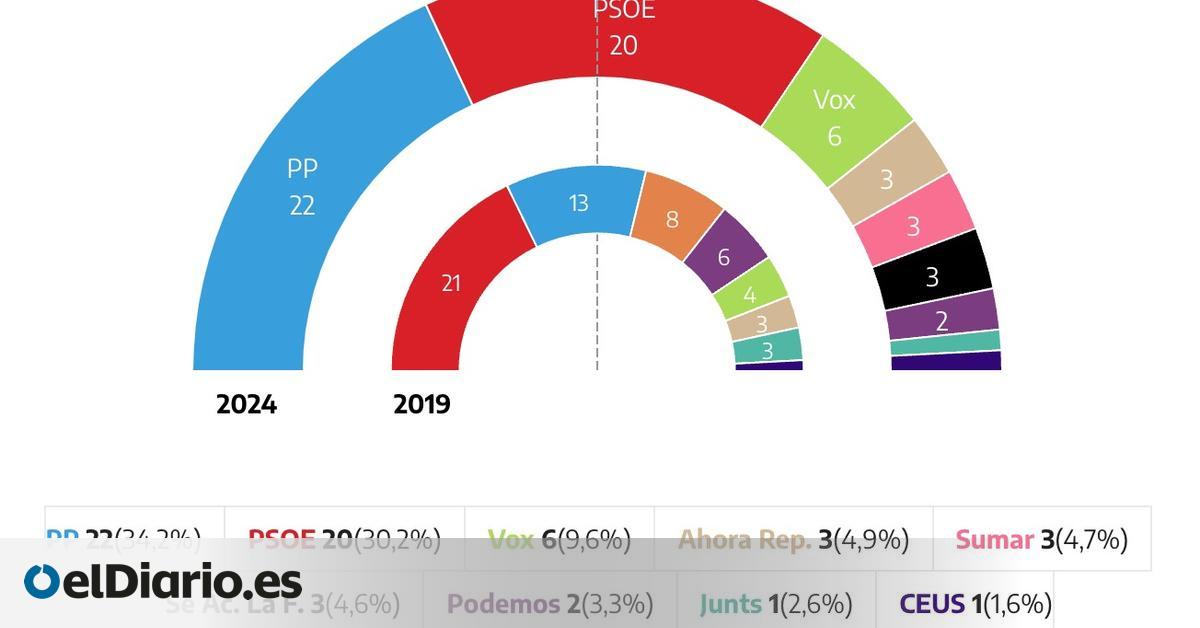
The Popular Party has been the most voted force in Spain in the European elections this Sunday, four points above the PSOE. The party led by Alberto Núñez Feijóo registers strong growth compared to five years ago and reaches 22 seats. However, the PSOE follows closely with 20 seats of the 61 that the country distributes in the new European Parliament, which will be made up of 720 MEPs. The increase in seats in the community chamber due to demographic growth, together with Brexit, which left the United Kingdom without representation, has meant that Spain now distributes seven more seats than in 2019.
9J Results – European
-% escr.
At the beginning of the campaign the PP’s advantage reached more than ten points, but in recent weeks the two main forces have been getting closer until the result was known this Sunday, with the scrutiny already almost complete at 11:00 p.m., just to the closing of the polling stations in Italy, the European partner that extended the opening of its voting centers the longest. The Popular Party obtained 34.19% of the votes compared to 30.18% for the PSOE.
Late last night, Dolors Montserrat, candidate for the European elections, celebrated that “the PP of Alberto Núñez Feijóo adds another electoral victory”, alluding to the municipal elections and the general elections, both in 2023. Feijóo himself added : “The Spaniards have given us a resounding, transparent electoral victory, the one we were waiting for.” “We are facing a new political cycle, facing a new responsibility that we assume with humility and a sense of State,” he added. Previously, the general secretary of the PP, Cuca Gamarra, considered Pedro Sánchez to have won the “plebiscite”, just as the popular people have proposed these elections.
“I want to congratulate the PP for the result in these elections,” Sánchez himself added, early in the morning. Later, he added: “The PSOE becomes the only government option capable of facing the far-right wave that is sweeping Europe and Spain. “We are going to continue working to consolidate a Europe of progress and progress.”
Their candidate for the European elections, Teresa Ribera, has spoken from the PSOE. After recognizing the victory of the PP, the vice president has also considered that “the only thing” that the popular have achieved has been to “absorb all the votes of Ciudadanos.” Unlike Gamarra, in her opinion, Feijóo “has lost the plebiscite” against Sánchez. And Ribera has emphasized that now “the extreme right has three faces” in Spain, something for which he has blamed the leader of the PP himself. Furthermore, she has considered that the appointment with the polls “has supported” the progressive Government and Sánchez as president, and has even “reinforced” him.
With six seats, Vox has managed to rebound and be the third force after increasing its support compared to 2019, when it was the fifth party in the country by adding 6.2% of the votes and four seats. It has now reached 9.62%. But this Sunday’s event will be marked by the emergence of a new force from the Spanish extreme right, ‘The party is over’, led by the agitator Alvise Pérez, who bursts into the new European Parliament with three seats and 4.58% of the vote. the votes.
Add, above Podemos
The fight to the left of the PSOE is won by Sumar, with 3 seats and 4.65% of the votes, while Podemos is slightly behind Yolanda Díaz’s coalition, with 2 representatives. In 2019, the Podemos-IU coalition obtained 10.1% of the votes and six MEPs.
“These are not the results we would have liked, but we are going to work for a Europe that advances in rights,” assured, at the last minute, the head of Sumar’s list for the Europeans, Estrella Galán. Irene Montero, the Podemos candidate, has instead focused her speech on sending a message to the Government: “To win the right, we need a government that governs and that takes on the most important challenges that our country has at this moment.” .
The bloc of nationalist and independence forces is led by Ahora Repúblicas, the alliance that brings together ERC, EH Bildu and BNG, which obtains three seats. Five years ago that same coalition won three seats, with 5.6% of support. Junts falls from the three representatives it achieved in 2019 and is now left with only one.
CEUS, the coalition led by the PNV, maintains its only representative, in this case in the figure of its candidate Oihane Agirregoitia. The president of the Basque nationalists, Andoni Ortuzar, has assured that his electorate has taken refuge in abstention
Ciudadanos disappears from the European Parliament and its candidate, Jordi Cañas, assumed late on Sunday that the party “closes a cycle after 18 years” since its birth.
Participation in the European elections this Sunday has decreased significantly compared to five years ago, but that year the call coincided with the holding of municipal and several regional elections, which caused participation to rise to 60.72. %. This year it remains at 49.21%.
Source: www.eldiario.es

